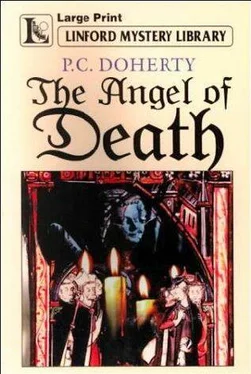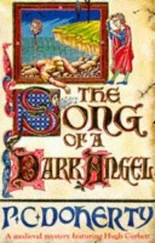Paul Doherty - Angel of Death
Здесь есть возможность читать онлайн «Paul Doherty - Angel of Death» весь текст электронной книги совершенно бесплатно (целиком полную версию без сокращений). В некоторых случаях можно слушать аудио, скачать через торрент в формате fb2 и присутствует краткое содержание. Жанр: Исторический детектив, на английском языке. Описание произведения, (предисловие) а так же отзывы посетителей доступны на портале библиотеки ЛибКат.
- Название:Angel of Death
- Автор:
- Жанр:
- Год:неизвестен
- ISBN:нет данных
- Рейтинг книги:4 / 5. Голосов: 1
-
Избранное:Добавить в избранное
- Отзывы:
-
Ваша оценка:
- 80
- 1
- 2
- 3
- 4
- 5
Angel of Death: краткое содержание, описание и аннотация
Предлагаем к чтению аннотацию, описание, краткое содержание или предисловие (зависит от того, что написал сам автор книги «Angel of Death»). Если вы не нашли необходимую информацию о книге — напишите в комментариях, мы постараемся отыскать её.
Angel of Death — читать онлайн бесплатно полную книгу (весь текст) целиком
Ниже представлен текст книги, разбитый по страницам. Система сохранения места последней прочитанной страницы, позволяет с удобством читать онлайн бесплатно книгу «Angel of Death», без необходимости каждый раз заново искать на чём Вы остановились. Поставьте закладку, и сможете в любой момент перейти на страницу, на которой закончили чтение.
Интервал:
Закладка:
Ranulf slunk back to his lodgings, anxious lest his master interrogate him, but Corbett was still trying to reconstruct what had happened at the high altar of St Paul's.
First, he listed what each priest had worn: a white alb bound by a cord over which there was a chasuble; the thick gold jewel-encrusted cope displaying the colour of the day's feast; a matching stole round the neck and an amice. Corbett remembered the copes and chasubles he had seen in the cupboard in the sacristy of St Paul's, thick, heavy, encrusted with jewels.
Secondly, he looked at the plan of the celebrants that day. On the far right of de Montfort had been de Eveden and the Scotsman, Ettrick. On the far left the young man, Blaskett, de Luce and Plumpton. Once again Corbett traced the way the chalice would have been passed. First, up to Ettrick, and then back along to Plumpton, de Luce and Blaskett before it was returned by de Luce and Plumpton to de Montfort who had taken the fatal sip. According to de Eveden he had not drunk from the chalice. Corbett wondered whether to believe him. He was sure, during the feast after the mass at which de Montfort had died, he had seen de Eveden drinking. So was the librarian lying? If he was not, the logical explanation would be that the chalice had been poisoned by Blaskett or de Luce. But there again, Plumpton on de Montfort's left, could be the secret assassin. Moreover, de Eveden may not have drunk from the chalice, but that did not stop him from poisoning it.
Corbett looked again at the diagram. He tried to reconstruct the altar as he had seen it when the king had sent him back to assess everything. He had seen something odd which was now mysteriously plaguing him, something very wrong. He remembered the stains on the altar frontal and the wine on the carpet. His mind chased the problem. He felt like a dog, loose in a forest chasing shadows, nothing substantial, except there was something evil about St Paul's. Perhaps, as a good servant of the king, he should insist that the whole college of canons be investigated by the Bishop of London and have the evil rooted out, for there was something malevolent beyond the normal animosities, jealousies and rivalries one would find in any small, enclosed community.
Corbett spent most of Sunday evening attempting to solve the puzzle, but he failed to reach a satisfactory conclusion. At last, he put down his pen, opened the shutters of his room and looked out over the city. A heavy mist had rolled in across the Thames, blanketing out the sky so that he could only see the odd winking glare of a fire or the lights of lanterns placed outside doors by householders. He wanted this matter finished. He thought of Ranulf upstairs and envied the young man's exuberance for every waking moment. Corbett looked up, the same sky now shrouded Maeve in Wales. Suddenly he felt a tremendous longing for her, almost a hunger which made him feel ill. All he could think of was her sweet face, long blonde hair and the wide innocent eyes which could suddenly crinkle with amusement or flash with anger. He was tired of the city, of the filthy streets, the offal, the lay stalls thick with muck, the sluggish river, the arrogant courtiers, the bickering and in-fighting amongst the clerks and, above all, the animosity of the canons of St Paul: liars, lechers, men who should have been pursuing goodness but seemed to have lost their way. He felt impatient with the king who had put him to this task: a man intent on power, who honoured Corbett only because Corbett had served him well. Yet, all the clerk really wanted was to be in a lonely room in Neath Castle overlooking the wild seas, seated before a fire with Maeve in his arms. In his garret, Ranulf, busy congratulating himself on his rapid and lucky escape from the mercer's wife's bedroom, heard the faint lilting sound of the flute. He knew Corbett was sad and wished he could help. The playing went on into the early morning before it fell silent and only then did Ranulf know that his master had found some peace in sleep.
Corbett slept late the next morning, until he was abruptly woken by a pounding on the door below. Throwing a cloak round him, he hurried down and opened it. The mists outside swirled and boiled like steam from a cauldron. At first, he could see no-one.
'Who is there?' he called out and leapt back as a muddied figure, with a cut on his face, stepped into the house. At first the thought of a secret assassin crossed Corbett's mind but the man pulled back a rain-soaked hood and let the cloak fall from his shoulders.
'Master Corbett?'
'The same.'
'I am John Enderby, messenger from the Sheriff of Essex.' He handed a small scroll to Corbett, who instantly broke the red-and-white encrusted seal. The letter consisted of only four lines: the sheriff sent Corbett health and greetings; the information he had sent would be given to him by his messenger, John Enderby, the bearer of this letter.
Corbett crumpled the parchment in his hands. 'Please follow me.'
Enderby followed him up the stairs and, once Corbett had made him comfortable, the man delivered his message.
'The sheriff,' he said, 'was sorry he could not give a full written report but that would have taken more time. Suffice to say that the sheriff's men went to the manor of Cathall where they had found Walter de Montfort's steward, Thomas, dead; his throat had been cut. His wife Katherine had been raped a number of times by a notorious outlaw band, led by Robert Fitzwarren. They had apparently come to the manor to meet Thomas and, because of some quarrel, had cut his throat and raped the poor woman until she was half-crazed. The sheriff's men were able to calm Katherine, whereupon she confessed to the most extraordinary story. How the same outlaw Fitzwarren had raided convoys of travellers, traders and merchants on the roads leading out of London into Essex. Fitzwarren's plunder, however, was passed on to the Dean of St Paul's, who had sold it in the market-place of London and divided the money with the outlaw leader. On the day de Montfort died, his steward had been present in the congregation of St Paul's, having come to London to settle business on behalf of the outlaw. Because of his master's death, however, the steward was unable to conclude this business and returned empty-handed to the manor of Cathall. There, the outlaws, disappointed and frustrated, had taken out their rage on Thomas and his wife.'
'The Sheriff added,' Enderby wearily related, 'that although the woman was half crazed, a search of the house had revealed certain goods taken months earlier from a merchant. The sheriff sent his greetings and good wishes to His Grace and hoped the information would be of use.'
Corbett made Enderby repeat the story a number of times, satisfying himself on certain details before calling Ranulf down and instructing him to take Enderby to a nearby tavern to find him lodgings, before the messenger's return to Essex. Once he was gone, Corbett lay on the bed, his hands clasped behind his head, and once again considered de Montfort's death. So far, he had concentrated solely on the canons of St Paul's but there were others who would wish him dead. The courtesan had said this and she had also been present. Did Thomas, the steward, have a hand in this? Did he in fact kill his master? Was the king totally blameless? After all, and Corbett had consistently overlooked this fact, the king hated the de Montfort family. There were yet others who, if they had known de Montfort had been bought, would have gladly destroyed him. Was Robert Winchelsea, His Reverence the Archbishop of Canterbury, above murder? Corbett would have liked to think so but, having spent some time with the canons of St Paul's, believed priests and bishops were as capable of murder as any member of the laity. Finally, there were the barons. Corbett had heard rumours, about how the barons were gathering, plotting in secret meetings, trying to resist Edward's demands to follow him abroad.
Читать дальшеИнтервал:
Закладка:
Похожие книги на «Angel of Death»
Представляем Вашему вниманию похожие книги на «Angel of Death» списком для выбора. Мы отобрали схожую по названию и смыслу литературу в надежде предоставить читателям больше вариантов отыскать новые, интересные, ещё непрочитанные произведения.
Обсуждение, отзывы о книге «Angel of Death» и просто собственные мнения читателей. Оставьте ваши комментарии, напишите, что Вы думаете о произведении, его смысле или главных героях. Укажите что конкретно понравилось, а что нет, и почему Вы так считаете.












